Related Research Articles
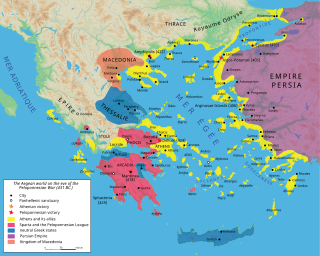
The Delian League, founded in 478 BC, was an association of Greek city-states, numbering between 150 and 330, under the leadership of Athens, whose purpose was to continue fighting the Persian Empire after the Greek victory in the Battle of Plataea at the end of the Second Persian invasion of Greece.

The Peloponnesian War was an ancient Greek war fought between Athens and Sparta and their respective allies for the hegemony of the Greek world. The war remained undecided for a long time, until the decisive intervention of the Persian Empire in support of Sparta. Led by Lysander, the Spartan fleet, built with Persian subsidies, finally defeated Athens and started a period of Spartan hegemony over Greece.

The 5th century BC started the first day of 500 BC and ended the last day of 401 BC.
Year 404 BC was a year of the pre-Julian Roman calendar. At the time, it was known as the Year of the Tribunate of Volusus, Cossus, Fidenas, Ambustus, Maluginensis and Rutilus. The denomination 404 BC for this year has been used since the early medieval period, when the Anno Domini calendar era became the prevalent method in Europe for naming years.

This article concerns the period 409 BC – 400 BC.
Year 408 BC was a year of the pre-Julian Roman calendar. At the time, it was known as the Year of the Tribunate of Iullus, Ahala and Cossus. The denomination 408 BC for this year has been used since the early medieval period, when the Anno Domini calendar era became the prevalent method in Europe for naming years.
This article concerns the period 429 BC – 420 BC.
This decade witnessed the continuing decline of the Achaemenid Empire, fierce warfare amongst the Greek city-states during the Peloponnesian War, the ongoing Warring States period in Zhou dynasty China, and the closing years of the Olmec civilization in modern-day Mexico.
This article concerns the period 399 BC – 390 BC.

Alcibiades was an Athenian statesman and general. The last of the Alcmaeonidae, he played a major role in the second half of the Peloponnesian War as a strategic advisor, military commander, and politician, but subsequently fell from prominence.
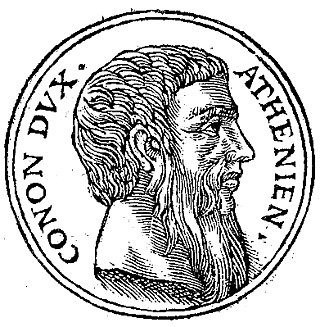
Conon was an Athenian general at the end of the Peloponnesian War, who led the Athenian naval forces when they were defeated by a Peloponnesian fleet in the crucial Battle of Aegospotami; later he contributed significantly to the restoration of Athens' political and military power.

Antalcidas, son of Leon, was an ancient Greek soldier, politician, and diplomat from Sparta.
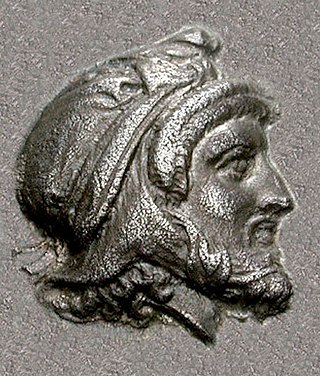
Pharnabazus II was a Persian soldier and statesman, and Satrap of Hellespontine Phrygia. He was the son of Pharnaces II of Phrygia and grandson of Pharnabazus I, and great-grandson of Artabazus I. He and his male ancestors, forming the Pharnacid dynasty, had governed the satrapy of Hellespontine Phrygia from its headquarters at Dascylium since 478 BC. He married Apama, daughter of Artaxerxes II of Persia, and their son Artabazus also became a satrap of Phrygia. According to some accounts, his granddaughter Barsine may have become Alexander the Great's concubine.
The naval Battle of Cynossema took place in 411 BC during the Second Peloponnesian War. In the battle, an Athenian fleet commanded by Thrasybulus and Thrasyllus, although initially thrown on the defensive by a numerically superior Spartan fleet, won a narrow victory. This victory had an impact out of proportion to its tactical significance, coming when Athens' traditional democratic government had been replaced by an oligarchy and an Athenian defeat could have ended the war. The newly confident Athenian fleet proceeded to win two more victories in the Hellespont in quick succession, the second being the dramatic rout at Cyzicus, which ended the immediate Spartan threat to Athens' Black Sea lifeline.
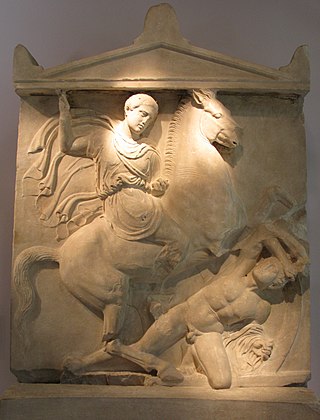
The Corinthian War was a conflict in ancient Greece which pitted Sparta against a coalition of city-states comprising Thebes, Athens, Corinth and Argos, backed by the Achaemenid Empire. The war was caused by dissatisfaction with Spartan imperialism in the aftermath of the Peloponnesian War, both from Athens, the defeated side in that conflict, and from Sparta's former allies, Corinth and Thebes, who had not been properly rewarded. Taking advantage of the fact that the Spartan king Agesilaus II was away campaigning in Asia against the Achaemenid Empire, Thebes, Athens, Corinth and Argos forged an alliance in 395 BC with the goal of ending Spartan hegemony over Greece; the allies' war council was located in Corinth, which gave its name to the war. By the end of the conflict, the allies had failed to end Spartan hegemony over Greece, although Sparta was durably weakened by the war.
The Battle of Abydos was an Athenian naval victory in the Peloponnesian War. In the battle, the Spartan fleet, under Mindarus, attempted to rescue a small allied fleet that had been driven ashore at Dardanus, but was attacked by the Athenian fleet, under Thrasybulus. The fighting was evenly contested for a great length of time, but towards evening, the arrival of Alcibiades with Athenian reinforcements tipped the balance in favor of the Athenians, and the Peloponnesians were forced to flee back to their base at Abydos, suffering heavy losses along the way.
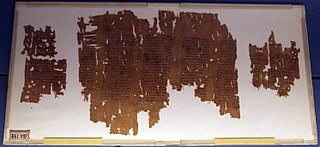
Hellenica simply means writings on Greek (Hellenic) subjects. Several histories of 4th-century Greece, written in the mould of Thucydides or straying from it, have borne the conventional Latin title Hellenica. The surviving Hellenica is an important work of the Ancient Greek writer Xenophon and one of the principal sources for the last seven years of the Peloponnesian War not covered by Thucydides, as well as the war's aftermath.

Classical Greece was a period of around 200 years in Ancient Greece, marked by much of the eastern Aegean and northern regions of Greek culture gaining increased autonomy from the Persian Empire; the peak flourishing of democratic Athens; the First and Second Peloponnesian Wars; the Spartan and then Theban hegemonies; and the expansion of Macedonia under Philip II. Much of the early defining politics, artistic thought, scientific thought, theatre, literature and philosophy of Western civilization derives from this period of Greek history, which had a powerful influence on the later Roman Empire. Part of the broader era of classical antiquity, the classical Greek era ended after Philip II's unification of most of the Greek world against the common enemy of the Persian Empire, which was conquered within 13 years during the wars of Alexander the Great, Philip's son.
Amorges, son of the Persian rebel satrap Pissouthnes (Πισσούθνης) of Lydia, was the leader of a Carian rebellion against king Darius II Nothus in 413 BC. He was captured by Tissaphernes and executed in 412 BC. During his Carian rebellion, he occupied and was sheltered in the port of Iasus. Athens was sympathetic to him during the Peloponnesian War against Sparta.
Astyochus or Astyochos was a Spartan navarch who served as commander of the collective Spartan naval forces along the coast of Asia Minor during 412–411 BC. He is regarded by many contemporaries and modern scholars as a key reason for Sparta's early failures in the Peloponnesian War. His expeditions consisting of encounters in Lesbos, Chios, Erythrae and Clazomenae all of which proved unsuccessful. He refused requests for help from Chios, causing the Spartan administration to become increasingly dissatisfied with his leadership. Thucydides portrayed Astyochus as timid and inept, and also depicted him as often in conflict with his peers in Ionia. Toward the end of his time as commander, he exhibited great reluctance to attack the Athenians and also failed to properly pay his troops, leading to riots and violence, and eventually, his removal as commander in 412 BC, to be replaced by the Spartan Mindarus.
References
- ↑ Thucydides. History of the Peloponnesian War.
- ↑ Vanessa B. Gorman (2001). Miletos, the ornament of Ionia: history of the city to 400 BCE. University of Michigan Press. p. 122. ISBN 978-0-472-11199-2.